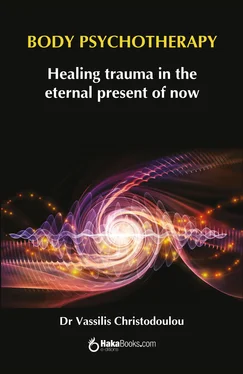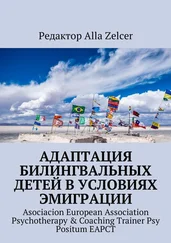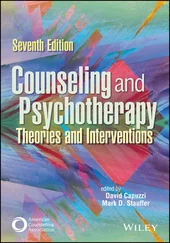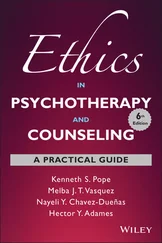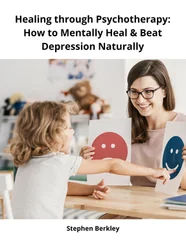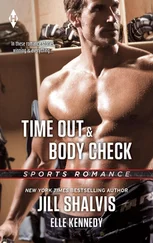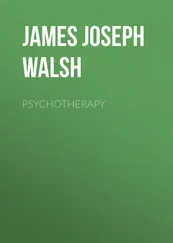
TITLE: Body Pschotherapy - Healing trauma in the eternal present of now
AUTHOR: Dr Vassilis Christodoulou, 2018
LAYOUT: HakaBooks - Optima, body 12
COVER: HakaBooks ©
COVER IMAGE: Dim Vassiliadis ©
1st EDITION: October 2018
ISBN: 978-84-18575-00-6
HAKABOOKS
08204 Sabadell - Barcelona
+34 680 457 788
www.hakabooks.com
editor@hakabooks.com
hakabooks
Prohibited, within the limits established by law and under the warnings provided by law, the total or partial reproduction of this work by any means or procedure, whether electronic or mechanical, computer processing, rental or any form of transfer of the work without written authorization of the copyright holders.
All rights reserved.
BODY PSYCHOTHERAPY
Healing Trauma in The
Eternal Present of Now
Dr Vassilis Christodoulou
Translation
Andrew Hendry
BIOSYNTHESIS

This book is dedicated
to my wife, Phoebe,
an eager companion,
tireless supporter
and sterncritic
at every step of my journey.
FOREWORD
by Lily Anagnostopoulou, Director of the
Greek Biosynthesis Center.
In this wonderful book Vassilis Christodoulou has succeeded in uniting heart and mind, a desire cherished by many people today and by society as a whole. In a work based on sound scientific documentation, he provides a commentary on the clinical cases that he presents. In this way he expresses the scientific principles of the psychological theory that underpins the psychotherapeutic procedure that he uses, without tiring the reader. With an obvious love for his patients, he presents the development of his healing methods in a way that moves the reader and carries them along with him on his arduous journey.
Vassilis Christodoulou has long experience in the field of psychotherapy. He succeeds in combining the knowledge he has acquired from his multifaceted studies in psychology with his wide-ranging interests in the broader sphere of psychotherapeutic practice. A bold seeker of the truth in therapeutic practice, constantly striving to find out what it is that ultimately brings healing, he closely involves us in this quest and generously offers us the experience and knowledge that he has acquired.
The paramount importance of the present, which is the only kind of time we really have, becomes apparent again and again in his descriptions of the ‘wonder of healing’. We can be healed. Our brains are plastic and are capable of recording new information, so long as we relive in a therapeutic setting the experiences we have repressed. The moment we relive the experience, the brain’s neural circuit opens in order to record a new experience in place of the old one. This is only possible for a short period of time. This is why the present in the therapeutic relationship is so important. It is the only thing that can repair a traumatic memory. This is the most recent finding of neuroscientific research, yet it is also ancient knowledge that has been known to healers for thousands of years. This is also what makes body psychotherapy the most suitable form of therapy for dealing with trauma.
We cannot be healed on our own. We need another person – at least one – to show us compassion. And compassion is not enough. Knowledge is also required, the kind that is acquired by experience. In order to help someone synthesise in their identity all the things that they had to detach themselves from in the past, the therapist must be able to recognise what those things are and he must have been through a similar experience himself. The powerful emotions of pain, anger and fear that are repressed in the body and forgotten by the mind because they were once considered to be unbearable by our system should also form part of the therapist’s own personal experience. They should not daunt him; he should be able to feel and accept them. In order to do this he himself must have already worked in this way – at least to a certain extent – with his own similar experiences. Only then can he light the way for another fellow human being who is trying to do the same thing.
Science is only now discovering that memories are recorded in cells. Not only in the brain but all over the body. And we are built to survive in such a way that unpleasant memories are recorded once and for all from the moment we have our first experiences of the world. Only now is science recognising the fact that our lives begin in the womb, that the recording of experiences begins there, that we are built from the bottom up, beginning with the senses and moving up to the emotions and the intellect. Truly stunning scientific discoveries are taking place that are serving to substantiate the empirical knowledge of body psychotherapists.
Yet the reader should not be deceived. Our bodily nature is not the way to matter. It is the earthbound way to the spirit. ‘Saintliness is a profound form of poetry which attunes the Universe to the verses of its Creator’, I once read in a talk given by Elder Makarios of Maroudas who, if I am not mistaken, was referring to the sayings of Elder Porphyrios.
Again, modern scientific knowledge confirms what we already know. The more integrated one’s brain is, the more aware it will become of the indivisible nature of things. An integrated brain is one in which the different parts cooperate and communicate with each other as a unified whole. This is achieved when the number of internal connections in the body, the nervous system and the brain is increased. Then man becomes aware of his connection with everybody and everything. It is as if his internal, individual connectedness recognises the external, collective unity. This is the kind of awareness that spiritual men have. Biosynthesis, without proclaiming a specific spiritual path, recognises the spirituality of all human beings as being the core of their existence. The therapy is the way which leads from the periphery – the neurosis – to the core – the essence.
Vassilis Christodoulou describes this journey to us and shows us the way in which he leads his patients. First, he tunes himself into his own broadened understanding and then calls upon his patient to share in a broadened identity. The broadening of our personal identity always leads to a broadening of our understanding, which entails a broadened awareness of existence. That’s how it’s always been. This is what all spiritual paths say, and this is what modern neuropsychological science says. And this is what we, as body psychotherapists and ordinary human beings, are concerned with.
Vassilis, thank you for clearly and effectively describing what goes on in therapy sessions and for presenting the material in such a way that it can be understood by the general public. This book will be of use to all biosynthesis therapists and I would like to believe that it will also be of interest to those engaged in other psychotherapeutic disciplines. At any rate, I am sure that it will touch the hearts of many individuals who are seeking their own healing, and help them to deal with their own traumas on a fresh footing.
Lily Anagnostopoulou
April 2015
‘So little… so much pain…’
‘Good heavens, we need so little, so very little, to live a normal healthy life… and so much pain is caused when we don't have it.'
These were Nikos’ first words in the therapy session after he had been connected with the need to be hugged by his mother when he was young. He did not have to undergo psychotherapy to realise that his mother had not been the hugging kind.
Читать дальше
